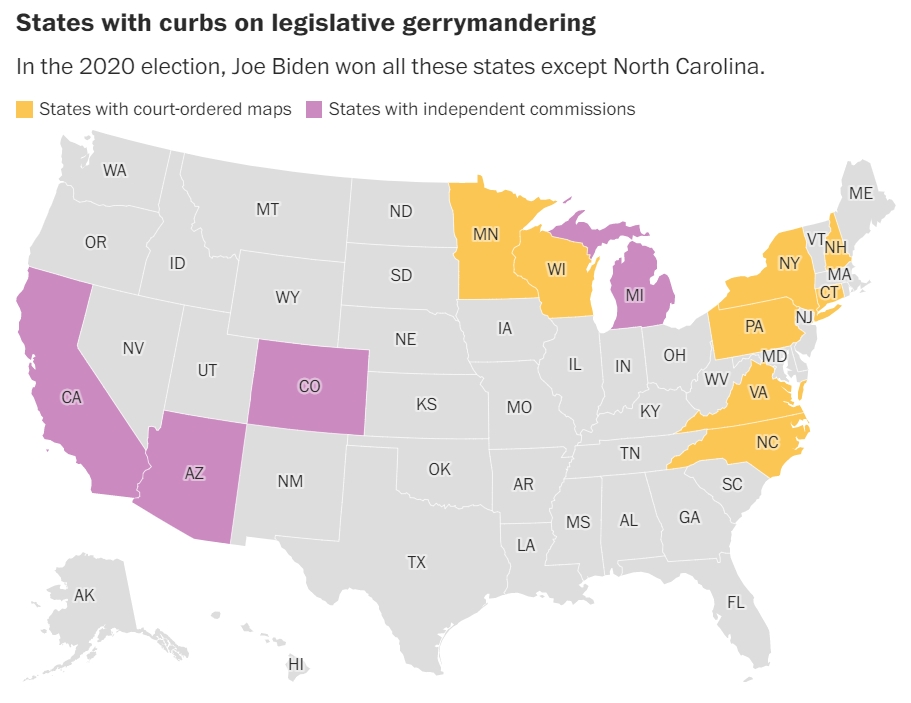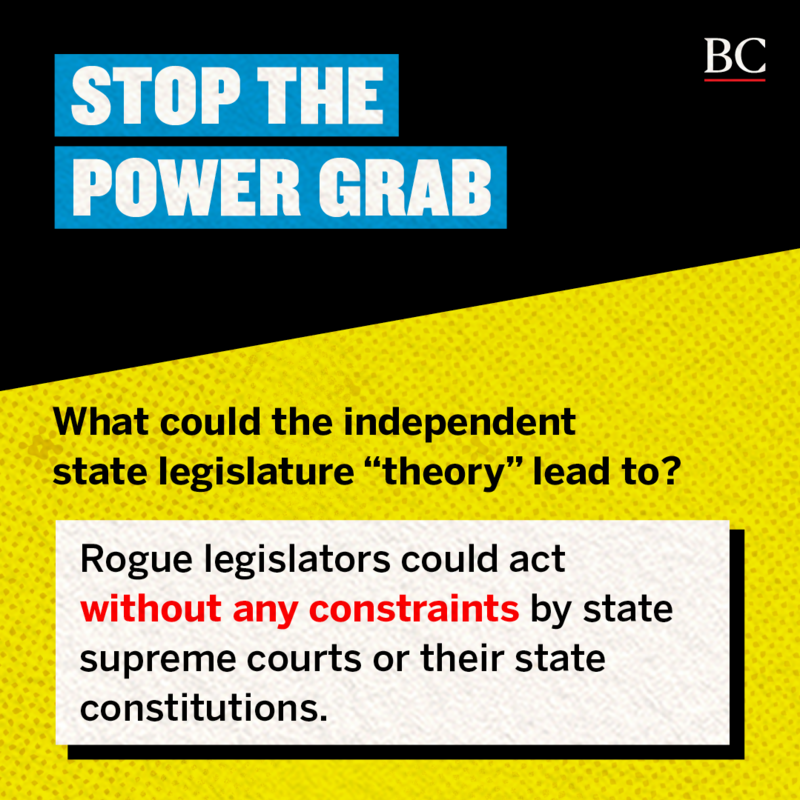I have repeatedly warned that the pending Moore v. Harper case pending in the Supreme Court is likely going to be a probably lethal blow to elections and American democracy. One expert has an interesting analysis worth considering. A WaPo analysis and opinion by Sam Wang (Professor of Neuroscience, Princeton University, director of the Electoral Innovation Lab) comments:
On Dec. 7, the Supreme Court will hear oral argument in Moore v. Harper, a case that could upend how states oversee federal elections and open the door to increased congressional gerrymandering. The central issue is a radical theory favored by a faction of legal thinkers on the right. But if they looked at the math, they would see that a win would likely backfire on Republicans.Petitioner Timothy Moore is speaker of the GOP-controlled General Assembly in North Carolina, where earlier this year the state Supreme Court overturned the legislature’s redistricting plans as “unlawful partisan gerrymanders.” Appealing that ruling, Moore and fellow legislators cite what has become known as the independent state legislature doctrine, or ISL — a theory based on the elections clause of the U.S. Constitution, which says, in part, “The Times, Places and Manner of holding Elections for Senators and Representatives, shall be prescribed in each State by the Legislature thereof.” This sentence has long been understood to mean that the legislature passes state election laws, but — like other laws — they must be consistent with state constitutions and can be overturned by court review or a governor’s veto. ISL proponents read it as giving sole authority to the legislature, removing one or more of the usual checks on runaway legislative power.But if the Republicans win in the U.S. Supreme Court, the result on a national scale would almost certainly benefit Democrats. Why? Because outside North Carolina, only swing states and blue states have curbed partisan gerrymandering. In Pennsylvania, New York, Connecticut, Minnesota, New Hampshire, Wisconsin and Virginia, this was done through the intervention of governors or voting-rights-minded state courts; in Arizona, California, Michigan and Colorado, citizen initiatives gave redistricting authority to independent commissions.One way to see the Democrats’ likely advantage: In the 2020 presidential election, the 12 states where districts were drawn by court order or by independent commissions gave 184 electoral votes to Joe Biden and only 15 electoral votes (those from North Carolina) to Donald Trump.
A win for Moore would potentially unleash all those states to redistrict at will. In contrast, in 19 states where Republicans already have legislative control of redistricting, many partisan gains are maxed out, and nothing would change.The justices could say that courts cannot use state constitutions to intervene, they could invalidate independent commissions, or they could take away the governor’s veto power over election laws. The Supreme Court has already declined to consider a case involving the third interpretation. We gamed out the other two by examining extreme partisan possibilities in each state. In both interpretations the conclusions were similar: Election maps completely controlled by state legislatures would change the overall balance of congressional seats in Democrats’ favor.The Supreme Court has at least three options for interpreting the independent state legislature theory in a logically consistent manner: The justices could say that courts cannot use state constitutions to intervene, they could invalidate independent commissions, or they could take away the governor’s veto power over election laws. The Supreme Court has already declined to consider a case involving the third interpretation. We gamed out the other two by examining extreme partisan possibilities in each state. In both interpretations the conclusions were similar: Election maps completely controlled by state legislatures would change the overall balance of congressional seats in Democrats’ favor.The first interpretation could potentially liberate several Democratic states to gerrymander by removing state court authority. For example, in April, a New York state court used anti-gerrymandering provisions in its state constitution to throw out a Democratic-drawn map that, based on our analysis of past voting patterns, could be expected to consistently elect 19 Democrats and seven Republicans to the House. The court-approved replacement map made five of the Democratic seats competitive, and four of these went Republican in the Nov. 8 election. If the Moore litigants win, New York and Maryland, where a second pro-Democratic map was overturned, would surely waste no time in restoring gerrymanders.
Democrats would also gain power if independent citizen commissions were struck down. In 2010, citizens gave an independent commission power over congressional redistricting in deep-blue California, with the support of then-Gov. Arnold Schwarzenegger, a Republican. Since then, Michigan and Colorado, two states now controlled by Democrats, have also formed independent commissions. Striking down these three commissions would give Democrats the ability to draw themselves up to a dozen additional seats.
Legal scholars both liberal and conservative have come out against the independent state legislature doctrine — some expressing concerns that the doctrine might embroil federal courts in endless lawsuits concerning future elections. Proponents of the theory are hoping to find a receptive audience in a reactionary and increasingly activist Supreme Court. But if the court steps back from taking this aggressive step, it will confound critics — and Republicans should consider themselves lucky.
In view of Dr. Wang’s analysis, I revise my confidence level from ~90-95% to ~65% that the Republican Supreme Court will make the independent state legislature theory or doctrine (ISLD) into binding law. This decision by the six Republicans on the bench will be made on the basis of what best serves the Republican Party’s grip on power.
If there was little uncertainty in the analysis, my confidence level would drop to ~10-15%. But there is significant uncertainty. One uncertainty arises from the fact that the Supreme Court does not act in a “logically consistent manner.” Wang’s analysis assumed a logical decision. I do not assume that. The current Republican Supreme Court acts in a blatantly partisan manner, e.g., the irrational Dobbs decision in 2022 that obliterated the constitutional right to an abortion. So despite three logical ways to decide, there are multiple ways to illogically decide, including a decision that is partly logical and partly illogical.
Another uncertainty flows from Republican ideology. GOP dogma is anti-democratic, authoritarian and party-centric, i.e., pro-concentrated power, especially for the Republican Party. The ISLD has great appeal to pro-concentrated power dogma. The ISLD gives state legislatures almost absolute power to subvert elections and turn them into a partisan farce. That is basically what Hungarian president Viktor Orban did to elections and democracy in Hungary after he was elected to power in a free and fair election. As discussed here before, GOP elites and leadership have made it very clear that what want to do to America is the same as what Orban did to Hungary. This 5 minute interview with an expert describes the the situation.
Dr. Wang focuses on gerrymandering, but my understanding of the ISLD is that it has a far broader scope than just gerrymandering. ISLD protects state legislatures from election subversion, voter suppression and vote fraud. ISLD isn't only about gerrymandering. It's about the entire election process.
Finally, there is some uncertainty in what affected blue states would do if the ISLD becomes the law. Affected blue states may not want to play hardball like what the red states do. My guess is that affected blue states probably would become more like red states. If so, this may not be much of a factor and Wang’s analysis on this point would probably be mostly correct for gerrymandering.






